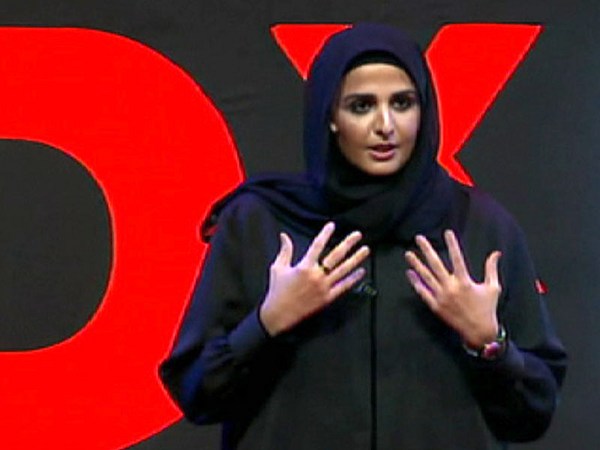Hello, TEDx, I’m Michael Sheen. I’m so sorry I can’t be with you today, but I didn’t want to miss this opportunity to be able to tell you a couple of stories that I think you might enjoy. The first one is about the town where I come from. It’s called Port Talbot, it’s in South Wales. It’s sort of, I guess, famous for a couple of things. It’s got a steelworks. It’s a mainly working-class town, built up around the steelworks, big council estate, to house the workers there, that my grandparents grew up on and my parents grew up on as well. And it’s also, I suppose, known for, weirdly, actors. And I said that this story was going to be about the town. It’s actually about a couple of people who come from the town. So this first story was told to me, it’s from the horse’s mouth. So one of the legendary sons of Port Talbot is, of course, the great actor Richard Burton. The story goes that Richard Burton, at the height of his fame, came back to Port Talbot and was staying at his elder sister’s house, Cissy, who actually raised him in Port Talbot, and he’d come with his impossibly glamorous wife at the time, Elizabeth Taylor. And they were there, in Cissy’s house in Port Talbot, and there was a knock on the door, and Cissy went to open the door, and there was a young lad. He said, this young lad said, “Is... is Richard Burton there?” And Cissy was like, “Ritchie, come, there’s a lad here to see you.” So Richard Burton comes down and this young lad’s standing there looking at him, “It’s the great Richard Burton.” And Cissy says, “This young lad wants an autograph.” And Burton said, “Do you speak Welsh?” and the lad was like, “No.” “Not a proper Welshman then.” And Cissy says, “This young lad is the son of the bakers round the corner, down from where the Regent cinema is.” And Burton said to this little lad, “I used to work at the co-op just up the road from the cinema. I was hopeless.” This little lad couldn’t believe that he got his autograph. And this little lad grew up into a man who told me that not only was this an extraordinary moment for him, because it was Richard Burton who was doing on the biggest stage what he hoped that he would do when he grew up, but also because this little lad was always told he was a bit stupid, a bit “twp”, as we say in Wales. And the great Richard Burton, saying that he was always a bit hopeless as well, gave him such hope. Now, that little lad grew up to be Anthony Hopkins. And Anthony Hopkins told me that story. And I, me, myself, growing up in Port Talbot, it was knowing out there had been Richard Burton and out there now was Anthony Hopkins, two people who came from the same town as me, who sounded like me, a bit, who looked a bit like me, but were out there. If it was possible for them, then maybe it would be possible for me. Now, that is an incredibly important thing. To see your background, your experience, your history represented out there in the world, having a voice, speaking on a platform, doing the things that perhaps you hoped you would be able to do. If you can’t see yourself out there or anyone who looks like you or sounds like you, it’s very hard to imagine that you’ll be able to do that as well. And that’s one part of what was incredibly important. I’ve realized over the years of what was incredibly important about me being able to have the life and the opportunities and the career that I’ve had. But it’s only one part. I’ve realized more and more as time has gone on, how much I owe everything, all the opportunities I’ve had, to other people, and the work of other people. I come from an incredibly supportive family. All my family were into performing in some way, amateur performing, so I knew from a very early age that it was something that you could do and that you got brownie points for, so that was important. And as time went on, my family was always there to take me to school rehearsals in the evening, youth theatre, whatever it might be. They’d come and see me in any performance I was doing, and that meant a lot. It’s meant a lot more to me as time has gone on, because, of course, I took everything for granted, didn’t I, at the time. But having that supportive family was incredibly important. And coming from a community, a working-class community like Port Talbot, a steel town, it’s not somewhere that you would expect to be that supportive of people going into the poncy arts, you know. But Richard Burton had done it, Anthony Hopkins had done it, and there was a kind of nobility to it. There was certainly a respectability to it and a respect for what they had done. And so that made a big difference. But in some ways, I think the most important part was that I was able to do performances in school, drama in school, and then I auditioned for a local youth theatre, the county youth theater. Again, at the time, I took it all for granted. But now I look back and I can see that there was an incredibly... powerful youth arts infrastructure that had grown up in the area. Not by chance. It hadn’t happened randomly. It was because of one man, called Godfrey Evans, who was a teacher at the Comprehensive School on the Sandfields estate. That was the estate that housed the steelworkers’ families. He had created an incredibly progressive, liberal theatre program in that comprehensive school, and eventually that spread to the entire county. And he became the chief advisor of County, of drama and dance in the county and created the youth theatre that I was a product of, that Russell T. Davies was a product of, many, many people. The youth dance company that Catherine Zeta-Jones was a product of, the orchestra, the brass band. It was an incredible, diverse array of Arts, all funded through the education system. And I was absolutely a product of that. I joined the youth theatre, and at a certain point, everyone in our youth theatre just auditioned for drama schools, got in, went off to drama schools in London, went into the profession. I never questioned it. I didn’t think it was strange or odd in any way. I was just like, that’s what happened so that’s what I did. And I got a grant to be able to go to RADA in London, came to RADA, and then, left RADA, went straight into the West End doing a play with Vanessa Redgrave, never looked back. As time has gone on, I’ve seen that pathway, let’s call it, disappear. So I know that if I was around now, starting off, that pathway wouldn’t be there. And I had tremendous advantages, I realize now, with family, community, all kinds of things. And it does make me worry that not only has my pathway disappeared, my school stopped doing drama, school closed down eventually, the youth theatre lost its funding, and grants weren't available anymore for people to go to drama school. So I’ve seen my footsteps kind of disappear. And I think if someone like myself, with all the advantages I had, wouldn’t be able to do it, what about the kids out there who don’t have those advantages, who don’t have a family who can take them to youth theatre rehearsals or you know, whatever it might be, don’t have a school that pushed them, who don’t have that kind of infrastructure there to create that pathway for them. What happens to them? And then that leads to a bigger question, I suppose, of, if young people, coming from certain kinds of working-class backgrounds aren’t able to come through into the Arts, I was an actor, but it could be any anything within the Arts or creative industries or journalism, writing. The conversation that we have as a country, as a nation, as a community, what is that conversation like if we’re only hearing from the people who are able to afford to get through to the point where they get to speak, get to have a voice? It makes that conversation incredibly one-sided. I mean, there are figures that I can quote you, that I’ll just keep to a few. But the Office of National Statistics reported a few years back that of all writers in Britain, 47 percent came from the most privileged social starting points, compared to ten percent coming from working-class backgrounds. The Sutton Trust Report in 2019 said that of newspaper columnists... so these are people who’ve really got a big part to play in setting what our national conversation is, newspaper columnists across the political spectrum, 44 percent of those newspaper columnists come from independent schools, whereas only seven percent of the population, generally, go to independent schools. So there’s a massive over-representation there. And of those newspaper columnists, 33 percent, one in three, are part of that independent school, Oxbridge, pathway, pipeline. And those are the people who have an enormous part to play in setting what our conversation is. You know, who gets to speak, who gets to tell their story, and how does it get told? And if that pathway is there for people coming through independent schools and Oxbridge, and that’s not just into acting or writing, that’s across the top jobs across our whole nation. Where are those other pathways for people who are not coming from those sorts of backgrounds? It's so important that we start early to create those pathways. In some ways, I feel like it’s too late by the time you’re 18, 19, out in the world. How do you get people, young people, young kids, to feel like there’s something out there for them, that they see themselves represented and know that it’s possible, as Anthony Hopkins did with Richard Burton, as I did with them? And how do you then create the pathway from that moment? And let’s say that moment happens where you see the possibility for you doing something. Where’s that yellow brick road that goes from there, all the way to actually getting into the industry you want to be in? If that pathway doesn’t exist, because it certainly exists for some people, but it doesn’t exist for you because of some accident of birth and geography, what happens then? There will always be individuals who are able to break through in some way, or get support and become the exception to the rule. But how do we change structurally our system, so that it’s not just about individuals breaking through, that everyone gets the same opportunity? So I found myself sitting at my kitchen table during the first lockdown, talking to Professor Katy Shaw about a project she had been involved with, that I was incredibly inspired by, the Common People project. I suddenly had a grandiose vision of supporting people coming from working-class backgrounds, under-represented backgrounds, in storytelling. And we started to hammer out an idea for a project that could go out into communities and towns, and look for those people. We started to think about a project where people were given the opportunity, asked to get involved, and then were supported through it and would get mentors. So people who've already made a mark in the industry, in the areas that they wanted to, helping them, supporting them, advising them, giving them a bit of confidence. And then to create a platform for what came out of it, to be shared nationally and to try to influence industry. Whether it’s publishers or, you know, broadcasters or whoever it might be, to open their doors. And first of all, to acknowledge the difficulties and obstacles and then encourage people to come in, to renew us. To hear voices that we’ve not heard from historically. And to hear of those experiences and those stories told by themselves, rather than having their story told at them, or to them. People are able to actually tell their own stories, and we believed that that would be an incredibly powerful thing, not only for the individuals involved, but for all of us. And so A Writing Chance was born through that conversation, really. We have 11 people eventually who got through to be the first cohort who would go through the programme and get mentoring and financial support, and everything else. And I remember reading Stephen Tuffin’s piece that he submitted, which was about caring for his mother in her final days. And I remember thinking, not only is this one of the most moving things I’ve read in these submissions, it’s one of the most moving things I’ve ever read. It was an extraordinary, searing, incredibly raw, beautiful piece of writing. And in that moment, I knew that this was going to exceed all expectations. And it did. The 11 writers that we finally worked with for the last year, reading what they’ve done, has been absolutely revelatory. Whether it’s reading about the experience of marginalized bodies, by Grace Quantock. Lifting the veil on what it is like to live with a disability and how people relate to that. It’s extraordinary. Everything she's written has been extraordinary. Stephen’s piece, which is about caring for his mother in her final days, I will never forget that piece. It will stay with me for the rest of my life. There’s David Clancey, hairdresser in Ulverston, talking about how he turned, having gibes thrown at him for being gay when he was younger, being kicked out of his own house by his parents for being gay and then having to move back into the house with his mum, or choosing to move back into the house with his mother and father as the pandemic struck, in order to look after them. That experience. Whether it’s Maya Jordan, coming to write a novel about the goddess of the River Severn. These are incredible pieces of writing from and with voices and experiences that I just never heard before. It’s absolutely revelatory to me. To see their writing in a magazine, or a national newspaper, being performed live on stage, being broadcast on BBC Sounds in a podcast. This is extraordinary stuff. I remember Maya Jordan telling me that when the idea of being a writer on her estate, she said, “There were no writers on our estate. To say to someone that you wanted to be a writer was like saying you wanted to be an astronaut.” It was amazing to be able to go up to Maya after the live performance that we did in Cardiff. And to say to us all, “How does it feel to be an astronaut?” (Music) (Applause)
Related talks
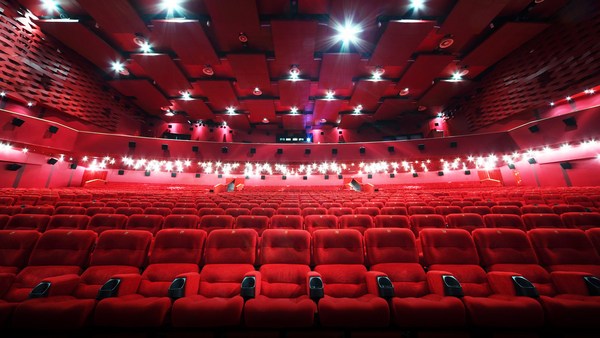
Beeban Kidron: The shared wonder of film
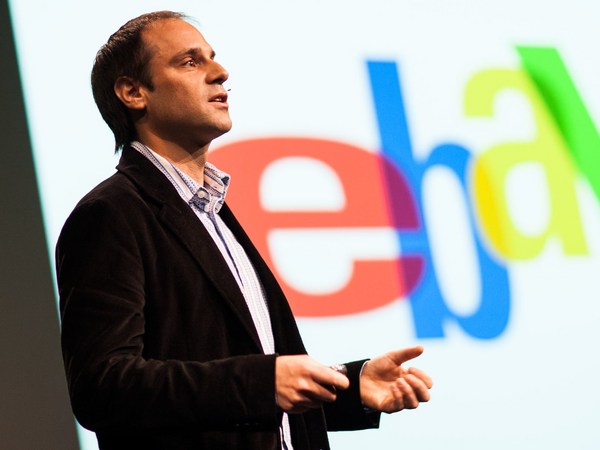
Jeff Skoll: My journey into movies that matter
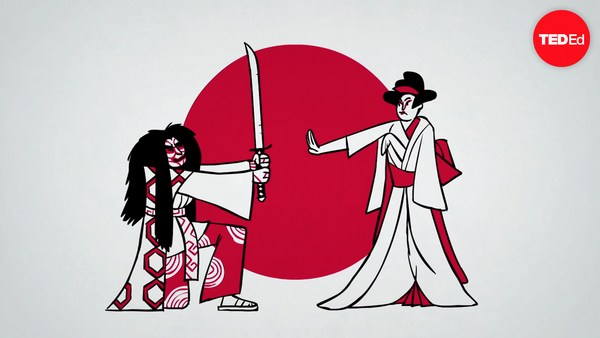
Amanda Mattes: Kabuki: The people's dramatic art
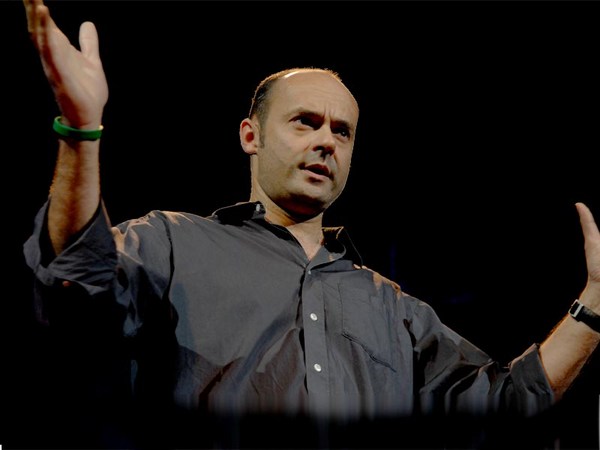
Franco Sacchi: A tour of Nollywood, Nigeria's booming film industry
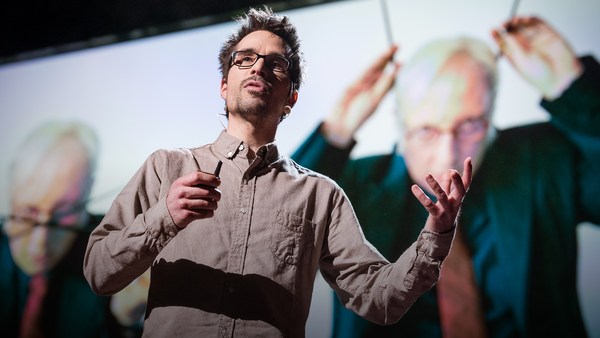
Martin Villeneuve: How I made an impossible film
